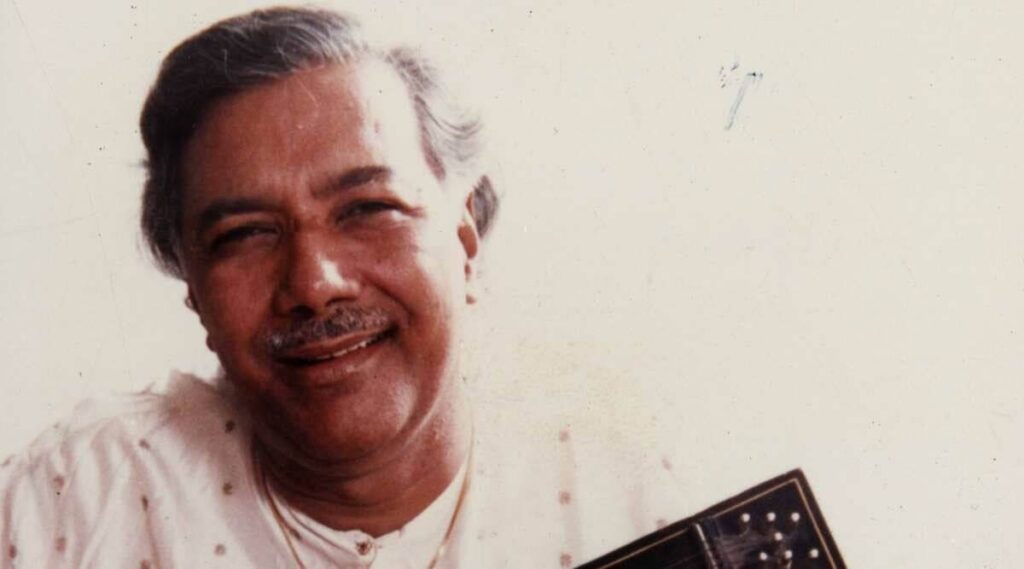Badaun, UTTAR PRADESH / Mumbai, MAHARASHTRA :
He was awarded the Padma Shri in 1991, Sangeet Natak Akademi Award in 2003, Padma Bhushan in 2006 and Padma Vibhushan in 2018.

In Umrao Jaan (1980), filmmaker Muzaffar Ali’s seminal film, a five-minute melody manages to put life’s ebb and flow in perspective. The raagmala Pratham dhar dhyaan dinesh illustrates the induction of the protagonist, Ameeran, into classical music and dance and showcases her metamorphosis into Lucknow’s fanciful courtesan, Umrao Jaan.
Composer Khayyam’s composition is ambitious and arduous—based on seven ragas each of which defines time, mood and colour of varied moments in life. To sing this, Ali chose Ut Ghulam Mustafa Khan—the Hindustani classical giant whose deep and dazzling voice was representative of not just an iconic lineage but also a rigorous riyaaz and years spent teaching some of the greatest musicians of our time.
Opening with an alaap that chimes with the word Allah, the melody merges into Brahma, giving a glimpse into the Awadh of the 19th century, when the syncretic fusion of cultures in music was a norm. But a more remembered piece is perhaps Jhoola kinne daala re amaraiyan in raag Desh, the story of a bedecked swing on which two lovers sway together.
Ut Ghulam Mustafa, one of the finest Hindustani classical vocalists and torchbearer of the Rampur Sahaswan gharana, died at his home in Mumbai on Sunday. He was 89.
Expressing his condolences, PM Narendra Modi tweeted, “The passing away of Ustad Ghulam Mustafa Khan Sahab leaves our cultural world poorer. He was a doyen of music, a stalwart of creativity whose works endeared him to people across generations. I have fond memories of interacting with him. Condolences…”
President Ram Nath Kovind tweeted, “…In his passing, music world has lost not only a doyen but also a mentor for young generation…”.
Ut Ghulam Mustafa was born and raised in Badaun, Uttar Pradesh. His mother was the daughter of the legendary vocalist Ut Inayat Hussain Khan, the court musician in Nawab Wajid Ali Khan’s court. He learned from his father Warish Hussain Khan, followed by tutelage under other family members, including Ut Fida Hussain Khan, court singer of Baroda’s royal durbar and then his cousin, Ut Nissar Hussain Khan.
His first performance was at a Janmashtami concert at the age of eight, where he was hailed as a child prodigy. What was also interesting about Ut Ghulam Mustafa was his openness to all forms of music, a rarity in classical maestros of his time. So when most classical singers were banishing Hindi film music, he found it easier to adapt.
According to Pune-based dhrupad maestro Uday Bhawalkar, Ut Ghulam Mustafa changed the colour and tone of how music in Rampur Sahaswan gharana sounded. “Someone like the great Ut Nissar Hussain had an aggression in the tone. Ut Ghulam Mustafa toned it down and made it softer,” says Bhawalkar.
The musician also sang in Mrinal Sen’s Bhuvan Shome (1969), and Badnam Basti (1969) among others. Another significant performance was a part of Coke Studio @MTV where composer and Ut Ghulam Mustafa’s student AR Rahman presented his guru on stage. The musician sang a composition in raag Yaman alongside guitars and drums.
Ut Ghulam Mustafa, till he died, remained an eminent guru to many leading musicians including Asha Bhosle, Manna Dey, Ut Rashid Khan (also his nephew), Waheeda Rehman, Geeta Dutt, Hariharan, Sonu Nigam, Alisha Chinoy and Shilpa Rao.
He was awarded the Padma Shri in 1991, Sangeet Natak Akademi Award in 2003, Padma Bhushan in 2006 and Padma Vibhushan in 2018.
Once at a concert in Mumbai, Ut Ghulam Mustafa sang a thumri in Pilu, and got Ut Bade Ghulam Ali Khan on his feet. “Iitne dooble patle ho, kahan se gaate ho?” asked the musician. Ut Ghulam Mustafa Khan’s music, his bracing voice, its irrepressible vigour, probably came from his strict training. But also, from the joy he got from the seven notes that represented life for him.
source: http://www.indianexpress.com / The Indian Express / Home> Lifestyle> Art and Culture / by Suanshu Khurana, New Delhi / January 18th, 2021








